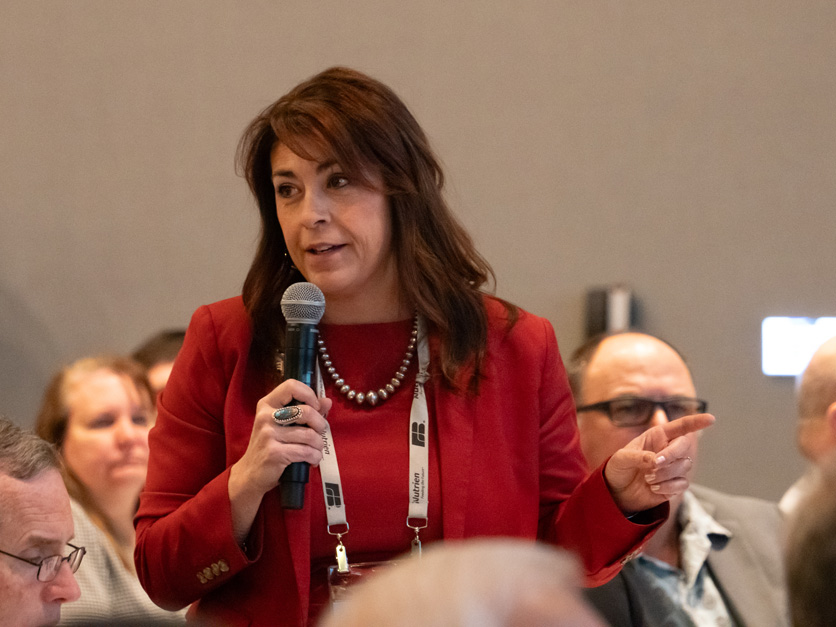A slight change to the policies of the nation’s largest farm organization could open the door to more support for future immigration legislation.
Members of the American Farm Bureau Federation wrapped up their 105th annual convention Tuesday in Salt Lake City by updating the organization’s policies on several issues, including a shift that many of its members hope could prove helpful in addressing the long-running issue of access to ag labor.
“I want my son to be able to find workers on our farm. I don’t want to leave this problem to him,” Arizona Farm Bureau President Stefanie Smallhouse said during the debate.
 Stefanie Smallhouse, Arizona Farm Bureau
Stefanie Smallhouse, Arizona Farm BureauAt issue was a proposal to add language that AFBF “may accept visa caps for a year-round program” so long as the limitations “do not restrict farmers and ranchers from using the visa program” and meeting their ag labor needs. Several members were opposed to the verbiage and the signal it sent that the organization was willing to accept anything short of an un-capped program.
“When you tell a group of politicians that you are willing to accept caps, trust me, you have automatically weakened your negotiating point,” South Carolina Farm Bureau President Harry Ott said.
“My fear is once Farm Bureau opens that door to caps” lawmakers may also consider caps on the H-2A temporary ag worker program, he added.
But several delegates also spoke to the reality that any potential year-round program would have to be capped due to administrative limitations and other concerns.
The Farm Workforce Modernization Act, reintroduced last year, would expand H-2A program to year-round workers but cap the number of green cards at 40,000 a year. An earlier version had a limit of 20,000.
“I’m not for caps, but … we have individuals in the ag industry who we represent who have a need for a year-round worker program. Their cap today is zero. They have no program,” Idaho Farm Bureau President Bryan Searle argued.
While no limitations on the number of foreign-born ag workers would be the ideal scenario for many sectors, “at the end of the day we have to face the fact that it is going to be capped,” Texas Farm Bureau President Russell Boening said.
A vote to strike the language ultimately failed 120-222.
After debate on the resolution concluded, Ott asked American Farm Bureau President Zippy Duvall how Farm Bureau would determine what level of cap would be acceptable, something Duvall said would be a group discussion.
“That decision lies with the board,” he said. “No one in this room wants to solve this problem worse than I do. No one.”
After the session, Duvall told Agri-Pulse he welcomed the flexibility Farm Bureau delegates had given the organization.
“We had no leeway that we could support a cap in any way, and now we have the opportunity to discuss it and then negotiate a cap, maybe for something else that we aren't willing to move on,” he said. “So I feel a lot better where we're at.”
Duvall also noted “there’s not a good study out there that tells us with good sound data how many workers are really needed year-round,” and Farm Bureau is looking to study the issue further.
It’s easy to be “in the know” about what’s happening in Washington, D.C. Sign up for a FREE month of Agri-Pulse news! Simply click here.
Other immigration policy changes included supporting the freezing of H-2A wages at 2023 levels and exempting H-2A employees from union membership since contracts are “already negotiated between the state and federal departments of labor.”
 Farm Bureau President Zippy Duvall
Farm Bureau President Zippy DuvallAFBF delegates also voted down a resolution that would have had the organization support “legislation that would remove taxation from interest earned on farm real estate loans.”
Debate over the matter frequently resembled the recall of individual delegates’ experiences with their local banks or farm credit lenders, and approving the measure would have essentially put Farm Bureau in support of the Access to Credit for our Rural Economy – or ACRE – Act, a major priority of the American Bankers Association.
David Richesin, a delegate from Tennessee who said he was also affiliated with a Farm Credit lender, cautioned Farm Bureau members against voting for the resolution, something he said would severely disadvantage Farm Credit lending.
“I think we don’t need to do anything that cripples the Farm Credit system,” he said.
Other actions taken by Farm Bureau delegates included:
- Voting down a resolution to support moving federal agencies out of Washington, D.C.
- Changing language supporting repeal of the Affordable Care Act to instead back the creation of a “market-oriented system of health care and delivery.”
- Supporting the Food and Drug Administration working to define a “clear regulatory pathway that allows for an approval process of new feed additive technology that clearly distinguishes the difference between animal drugs and feed additives.”
- Adding a chapter on artificial intelligence.
- Encouraging additional crops be made eligible for insured double-cropping.
- Backing the creation of a price support program for seasonal and perishable crops.
- Calling for a congressional investigation into the phosphate fertilizer supply chain “and high prices created by tariffs placed on imports by the International Trade Commission.”
- Formalizing opposition to the Opportunities for Fairness in Farming Act, which would restrict the lobbying activity of organizations that contract with checkoff organizations.
- Voting to oppose subsidies for electric vehicle charging stations.
- Supporting the creation of audit procedures for debt relief programs funded by the Inflation Reduction Act.
- Supporting additional resources for foreign farmland reporting laws and labeling the current protocols as “incomplete, flawed, and unclear.”
- Affirming the Committee on Foreign Investment in the United States as the “best entity to review transactions” related to agribusinesses, real estate, and critical natural resources.
- Backing additional pay for USDA county office employees and Farm Service Agency county committees and saying all new USDA employees should be fully trained in all facets of their job within a year of hiring.
- Affirming that USDA’s farm programs should be issued “without regard to race, color, national origin, sex, age, disability, and reprisal or retaliation from prior civil rights activity.”
Duvall and Scott VanderWal, the organization’s vice president, were both elected to a fifth term in their respective positions.
For more news, go to Agri-Pulse.com.


